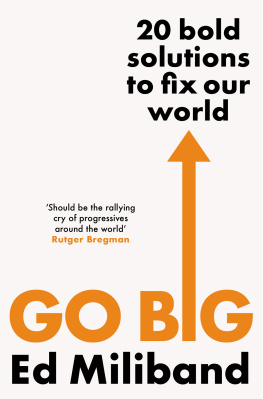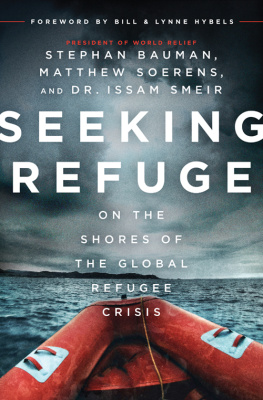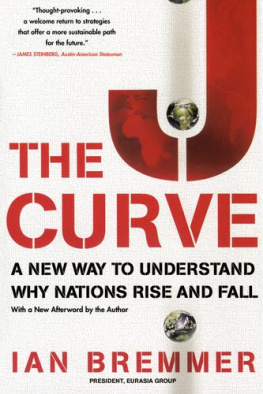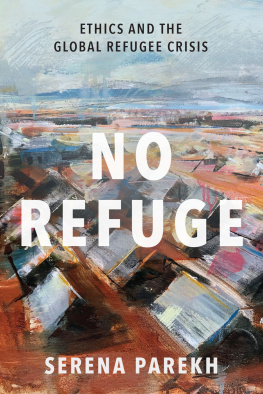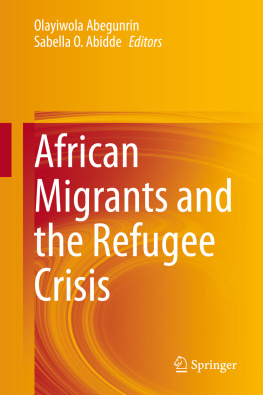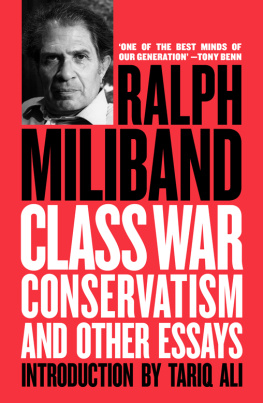
Simon & Schuster, Inc.
1230 Avenue of the Americas
New York, NY 10020
www.SimonandSchuster.com
Copyright 2017 by International Rescue Committee
All rights reserved, including the right to reproduce this book or portions thereof in any form whatsoever. For information, address Simon & Schuster Subsidiary Rights Department, 1230 Avenue of the Americas, New York, NY 10020.
Names in this book have been changed to protect the privacy of the people included.
TED, the TED logo, and TED Books are trademarks of TED Conferences, LLC.
First TED Books hardcover edition November 2017
TED BOOKS and colophon are registered trademarks of TED Conferences, LLC.
SIMON & SCHUSTER and colophon are registered trademarks of Simon & Schuster, Inc.
For information about special discounts for bulk purchases, please contact Simon & Schuster Special Sales at 1-866-506-1949 or .
For information on licensing the TED Talk that accompanies this book, or other content partnerships with TED, please contact TEDBooks@TED.com.
Interior design by MGMT. design
Jacket design by MGMT. design
Interior photography by Griff Tapper and Jacob Russell
Library of Congress Cataloging-in-Publication Data is available.
ISBN 978-1-5011-5439-3
ISBN 978-1-5011-5440-9 (ebook)
For Louise, my loving refuge, and for Isaac and Jacob, my wonderful escape
INTRODUCTION
The first refugees I ever met were my parents.
My father came to the United Kingdom as a refugee from Belgium in 1940. The day the Germans invaded, he and his father fled their home in Brussels. Walking and hitching rides, they made it to the port of Ostende and got on the last boat out of Belgium. In Britain, my father flourished. He learned English, graduated from secondary school in west London, qualified for the London School of Economics, and after a year of university joined the Royal Navy. He worked at sea on the cansheadphones used to listen to intercepts of German messaging. As a boy, I would feel great pride when he told me stories of the D-Day landings: he said that wherever you looked in the dawn light on June 6, 1944, there were boats of all shapes and sizes, so many that you could hardly see the sea.
My mother has her own refugee story, one that starts in Poland. She survived the war with her mother and sister, hiding first in a convent and then with an incredibly brave Warsaw family who welcomed her in. In 1946, her mother sent her to the United Kingdom to start a new life. Her father, David, was killed in the war. No one really talked about him when I was young. However, recently a German history group wrote to say that there was new confirmation that David Kozak had been sent from Auschwitz to Hailfingen concentration camp near Stuttgart toward the end of 1944. He died there in 1945.
My parents did what is most important to so many refugees: they gave their children the security they themselves had never had. My dad was nine when Adolf Hitler came to power in Germany; sixteen when the Nazis invaded his homeland and he fled to Great Britain; twenty-one when the war ended. The rise of fascism was the shadow over his childhood. My mother was five when she first had to go into hiding, seven when she was saved by the Warsaw family who pretended she was a relative, twelve when her mother put her on a boat to Britain with a group of Polish Jewish orphans. They were promised, and given, a new start in life by a prominent British rabbi, Solomon Schonfeld.
My parents ensured that I had none of these concerns. We were a middle-class, albeit foreign, British family. We were conscious of being Jewish but were not conspicuously so: no synagogue, no bar mitzvah. When I was nine in 1974, the big question for me was how Holland had lost the football (soccer) World Cup final to West Germany (which won 2 to 1). In a middle-class family, I was protected from the harsh winds of the Margaret Thatcher revolution in the United Kingdom: when I went to university in the mid-1980s, we were protesting against the introduction of university tuition fees, not paying them.
This personal backstory deeply affects how I see the refugee crisis. It makes real the idea that it could be me. For me, my familys experiences have turned refugees from a faceless category into blood and spirit. It demonstrates how our lives depend on the decisions of strangers.
In February 2017, I went to Khazer camp in Iraq, around 30 kilometers (18 miles) from Mosul, to meet people fleeing from the so-called Islamic State (I use the Arabic term Daesh in this book) as Iraqi forces retook the city. I met Nabil and Amira. They were sitting on a mattress in a tenttheir new home in the camp. They had nothing beyond the clothes they wore and carried, plus their memories and their fears. They told me about their daughter, still trapped in Mosul. She was married to a man who used to work for the Iraqi military. For that reason he had been forced to live underground in Mosul for more than two years for fear of being found by Daesh and executed. I couldnt hear their story without thinking of the perils faced by my own mother.
In another tent I met the Ibrahim familya husband and wife with three wide-eyed daughters. We ran a hundred meters to the Iraqi troops, but it felt like it took a year to get there, they told me. My thoughts turned to my dad and granddad making the 71-mile trip from Brussels to Ostende to board a boat to Britain.
Todays refugees are a different religion from my family. Their circumstances are different, and world politics are different. But they, too, are fleeing war and persecution. They, too, have lost all the security they ever had, left everything familiarhome, culture, family, workand risked their lives to reach safety. And the questions raised by their desperate flight are the same: How to eat, sleep, survive? How to start anew? Whom to trust?
One question stands above all others. It is a question to us who are not refugees: What are the duties of the rest of the world toward the innocent victims of war? What are our duties to strangers? That is what this book is about: the lives of 65 million people displaced by conflict and persecution in places such as Syria, Afghanistan, and Democratic Republic of Congo (DRC), and what our responsibilities are to them.
The Crisis
Crisis is an overused word, but the massive forced displacement we see today, the sheer number of people driven from their homes by war or oppression, deserves that description. This is a global crisis.
We are witnessing the largest flow of people fleeing for their lives since the Second World War. In total, they account for 1 in every 113 people on the planet. (about the size of the United Kingdom).
In the pages that follow, you will meet South Sudanese fleeing violence in the worlds newest nation to find safety across the border in Uganda, Syrians seeking respite in Jordan A symptom because it is a product of failed governance within nations and failed promises in the so-called international community; a cause because of the political instability that can come in its wake.
These refugees and displaced people are fleeing wars within states. Since the collapse of the Soviet Union and the end of the Cold War at the end of the 1980s, the number of civil wars has risen tenfold from the average between 1816 and 1989.
If the crisis were a blip, it might be considered immoral to hunker down and hope that the storm passes, but it would not have a global significance beyond that. However, civil wars have become increasingly long, and they are devastating for civilians caught in the cross fire. I believe we are seeing a trend, not a blip, driven by long-term factors that have not yet played out.
Next page

